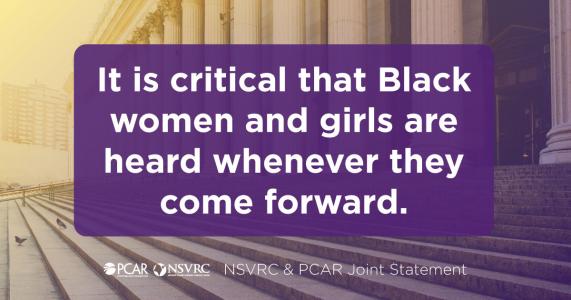Yesterday’s guilty verdict in the trial of R&B singer R. Kelly is a hard-won and symbolic victory for countless Black women and girls who are survivors of sexual abuse and assault. Our thoughts are with the survivors and their families, with the hope that this conviction can be a step towards healing.
R. Kelly committed abuse for decades, and while this truth was known, he has not faced legal accountability until now. This trial is one of the first high-profile cases of sexual assault where all of the victims who have testified are Black women and men. We must listen to and believe the accounts of Black girls, women, and men, who experience sexual violence at higher rates than other groups but are often disbelieved and face systemic barriers rooted in racism.
Despite increased attention to issues of sexual assault, harassment, and abuse following the resurgence of the #MeToo movement, Black survivors continue to be silenced and dismissed. One reason for this is the adultification bias that views Black girls as older and less innocent than their white peers. Too often, Black girls are not believed or blamed when they come forward with experiences of sexual abuse, as so many of the survivors abused by R. Kelly described.
It is critical that Black women and girls are heard whenever they come forward. We know that both validation and pain are among the many emotions survivors may be feeling. It should not take numerous accounts and years of repeating devastating details of abuse for survivors to be taken seriously. We recognize that the visibility of this case, R. Kelly’s vocal supporters, and the continued normalization of the abuse of Black women and girls have taken a deep toll on the mental health and well-being of Black, Indigenous, and People of Color communities.
The extent of the abuse inflicted on Black girls, women, and men by R. Kelly is just one example of how people who commit abuse weaponize their status and reputation to exploit the most vulnerable. It is vital that we hold those who commit sexual harassment, abuse, and assault accountable, regardless of their power, fame, or wealth. We must also recognize that R. Kelly did not act alone, as many individuals and groups were complicit in enabling these abuses and inflicting further harm on the victims.
This verdict would not have been possible without the Black women who for years have fought and organized for justice, such as Oronike Odeleye and Kenyette Barnes, founders of the grassroots movement #MuteRKelly. We celebrate Black-led and culturally specific organizations in the movement to end sexual violence who are leading support and healing in Black communities.
Help is available for all survivors and their loved ones regardless of when they experienced sexual harassment, abuse, or assault. For more information, call 1-800-656-4673 nationally or in Pennsylvania, call 1-888-772-7227.
To learn more about Black-led organizations ending sexual assault or to find culturally specific support, check out these resources:
Sisters of Color Ending Sexual Assault
Ujima: The National Center on Violence Against Women in the Black Community
The Swan Center for Advocacy & Research
We, As Ourselves led by ‘me too’ movement, National Women’s Law Center, and Times Up Foundation

